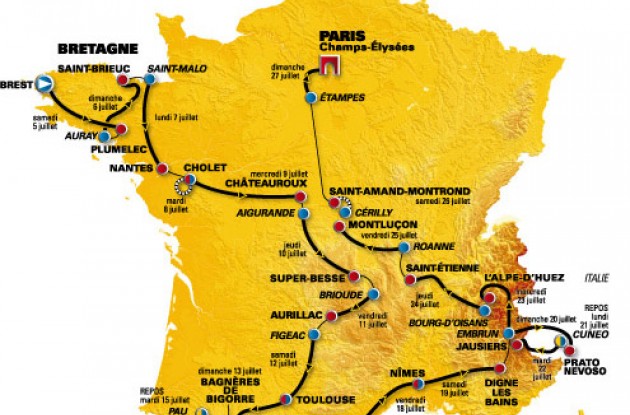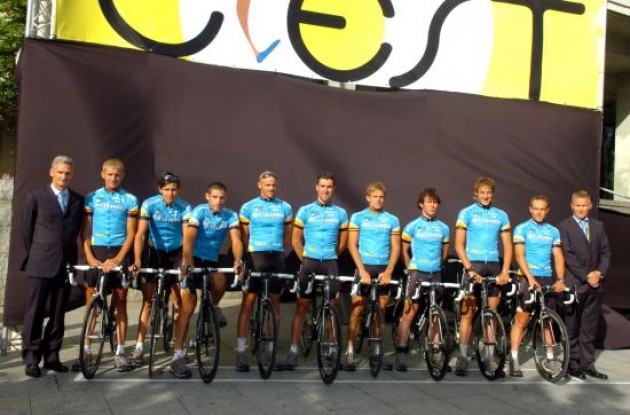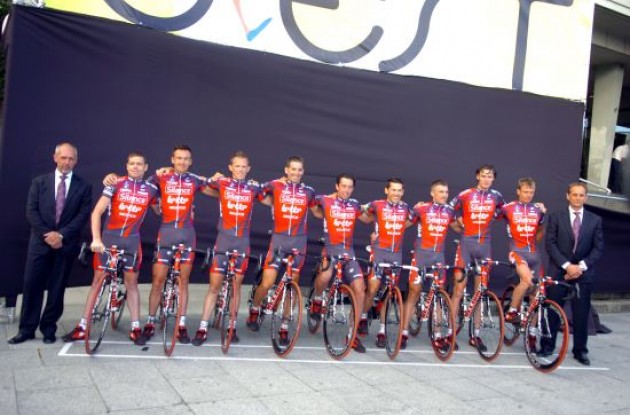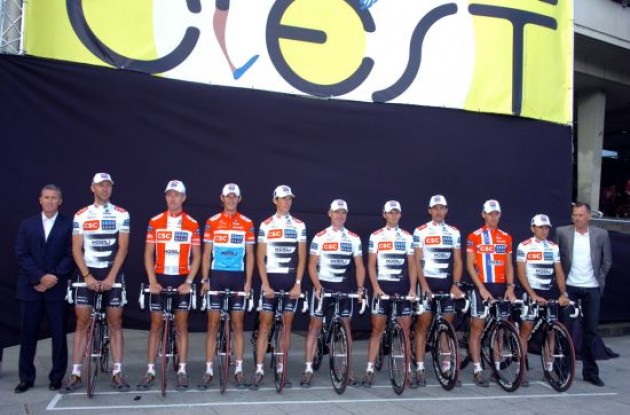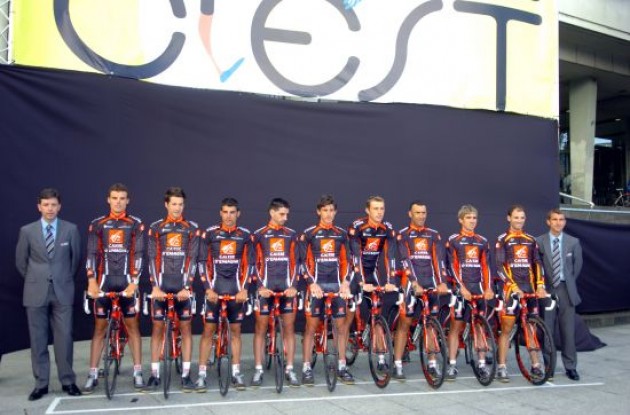2008 Tour de France Preview
Some have called this year's Tour de France parcours "classic." Oscar Pereiro (Caisse d'Epargne), the unrecognized winner of the 2006 Tour de France, has declared the 2008 Tour "the hardest that I will do." One cycling publication has referred to this year's route as "simpler," requiring fewer transfers than usual. The race, however, will be simpler, not simple. It will be 3,560 km long, with 10 relatively flat stages, four rolling ones, and five mountain stages. Pereiro's assessment of this year's route is probably closer to the mark than any of the other descriptions of it.
The Tour will get down to business right away. For the first time since 1966, the race will not have a prologue. Stage 1 will be a rolling, 197.5-km run from Brest to Plumelec. The finish is uphill, so a sprint finish will probably involve riders in addition to, or perhaps instead of, the usual suspects. The same is true of Stage 2, a rolling, 164.5-km ride from Auray to Saint-Brieuc. Stage 3, a 208-km run from Saint-Malo to Nantes, will be the first pure sprinters' stage. Stage 4, a flat, 29.5-km individual time trial, will see riders such as Fabian Cancellara (CSC) and David Millar (Slipstream) battle for the win. Two of the Tour favorites, Cadel Evans (Silence) and Alejandro Valverde (Caisse d'Epargne), will attempt to take seconds from each other.
Stage 5, a flat, 232-km run from Cholet to Chateauroux, will be the longest stage of this year's Tour de France. It should belong to the sprinters. The same cannot be said of Stage 6, a 195.5-km ride from Aigurande to Super-Besse that features two Category 2 ascents, including the finishing climb, in the last 40 km. Stage 7, a rolling, 159-km run from Brioude to Aurillac, will take the riders over three categorized climbs in the last 50 km, including the Category 3 Cote de Saint-Jean-de-Donne at 150 km. Look for escapees to take this one.
The sprinters will probably decide Stage 8. The rolling, 172.5-km run from Figeac to Toulouse will have four categorized climbs, but all of them will be in the first half of the stage, which will give the peloton a chance to reel in any breaks and set things up for their sprinters. Stage 9, a 224-km ride from Toulouse to Bagneres-de-Bigorre in the Pyrenees, will be the first major test for the climbers. The riders will breast the Category 1 Cols de Peyresourde and d'Aspin before plunging to the finish.
Stage 10 will be one of the 2008 Tour's most decisive stages. During the 156-km ride, the riders will breast the hors categorie Col du Tourmalet before tackling the finishing climb. Anyone who seriously aspires to win this year's Tour must be among the top finishers in this stage. Stage 10 will not decide who will win the Tour, but it will decide who will not.
After the first of the 2008 Tour's two rest days, the riders will take on Stages 11 to 14. The first three of these stages are similar, with rolling terrain that should allow getaways to stay away. Stage 11 will be a 167.5-km run from Lannemezan to Foix, Stage 12 will take the riders 168.5 km from Lavelanet to Narbonne, and Stage 13 will take them 182 km from Narbonne to Nimes. Stage 14, however, a 194.5-km run from Nimes to Digne-les-Bains, will be a gently rising stage that will permit the peloton to stay together and set things up for the sprinters to win.
Stage 15 will be the first Alpine stage. The 183-km ride from Embrun, France to Prato Nevoso, Italy will feature the hors categorie Col Agnel at 58 km and will end with the Category 1 finishing climb. The Col Agnel will occur too early in the stage for it to make a difference, but the GC contenders and the race's strong climbers will all fight for the day's honors on the climb to Prato Nevoso. The Tour's second rest day will follow the stage.
Stage 16 will return the Tour to France. The 157-km ride from Cuneo, Italy to Jausiers, France will take the racers over the hors categorie Cols de la Lombarde and de la Bonette-Restefond before plunging to the finish. The two climbs, particularly the second, should reduce the peloton to a lead group of about 10. Expect all of the GC contenders and mountain goats to be in that group.
Stage 17 will be the 2008 Tour's queen stage. The 210.5-km ride from Embrun to L'Alpe d'Huez will take the riders over the hors categorie Cols du Galibier, de la Croix de Fer, and the finishing climb. Three of the most famous climbs in Tour history will, in all likelihood, sort out the GC definitively. Expect a battle royal on the ascent to L'Alpe d'Huez among contenders such as Valverde, Evans, Carlos Sastre (CSC), and Frank Schleck (CSC).
Stage 18 will be a transitional stage between the Alps and the Massif Central. The rolling, 196.5-km ride from Bourg d'Oisans to Saint-Etienne will feature a Category 3 and a Category 2 ascent that will be tailor-made for escapees. The peloton, which will have just completed three days of climbing, will not pursue this group of no-hope adventurers, and one of them will win the stage. Who will it be? Perhaps Jens Voigt (CSC).
Stage 19, a rolling, 165.5-km ride from Roanne to Montlucon, could end with an escape by no-hopers or with a bunch sprint. Given that there are not as many sprinters' stages in this year's Tour as usual, the sprinters' teams might shut down any breaks and set things up for the likes of McEwen, Daniele Bennati (Lampre), and Thor Hushovd (Credit Agricole).
Stage 20 will be one last chance to sort out the GC. The flat 53-km individual time trial from Cerilly to Saint-Amand-Montrond will be perfect for Cancellara or Millar. Among the GC contenders, Valverde and Evans are the best time trialists, so this stage will be decisive if the race comes down to those two. Stage 21, as it usually is, will be a procession for the winner.
Who will the winner be? Cadel Evans seems to be the best choice. The Australian rides consistently well if not brilliantly in the mountains, and he is the best time trialist among the GC contenders. This season, he has scored three victories, and he looked good finished second at the Dauphine Libere. Evans is a logical favorite to win the Tour.
Alejandro Valverde is a good bet for second. The Spaniard can climb very well, and as he showed in winning the Dauphine Libere, his time trialing has improved dramatically. Valverde finished sixth in last year's Tour, and if he can avoid the climbing meltdowns that he sometimes has, he is certain to improve on last year's result. If his climbing and his time trialing are sharp for all 21 stages, he could win the Tour de France.
Carlos Sastre (CSC) has four top ten finishes in the Tour de France. His climbing keeps him in the race, but his time trialist lets him down. Moreover, at age 33, Sastre has probably peaked. The Spanish veteran should make the podium, but he is not a strong enough rider to rise higher than third.
Denis Menchov (Rabobank) has been picked for Tour success for a number of years. The Russian has always climbed well in the Vuelta a Espana, but the Tour is a different race. In addition, Menchov is a rather indifferent time trialist, although this year's Tour will have fewer time trial km than usual. Fourth place would be a reasonable result for him.
Frank Schleck (CSC) is the second half of a powerful one-two punch for CSC. The Luxembourger is a strong climber but a weak time trialist. His weakness will keep him off of the podium this year.
In 2004, Damiano Cunego (Lampre) won the Giro d'Italia, his first Grand Tour. Since then, he has not won another, but he has won tough climbing classics such as the Amstel Gold Race and the Giro di Lombardia. The Italian has acquired maturity; indeed, the only thing that he has not acquired is time trialing proficiency. The failure to acquire that will put him in sixth place.
Mauricio Soler (Barloworld) is an excellent climber. The Colombian, however, is a weak time trialist, and his team is not strong enough to support him. He is only 25, and he might win the Tour someday. He will not do so in 2008, however.
Kim Kirchen (Team Columbia/High Road) is a strong all-arounder. The Luxembourger has won the Fleche Wallonne and has ridden strongly in the Tour de Suisse. Although his time trialing has shown signs of improving, it is still not strong enough to worry the GC contenders. Pencil in Kirchen for eighth.
The absence of Alberto Contador and Levi Leipheimer will leave a large gap in this year's Tour de France. The Astana pair were excluded from the race when the Societe du Tour de France excluded the team because some of its now former members failed drug tests. The justice of the exclusion has been debated from that day to this, but the pair finished first and third last year and could have been expected to do as well this year.
In other competitions, Thor Hushovd will win the points competition for the second consecutive year, and Soler will take the King of the Mountains competition. Check out the sprint wars as well. People such as Mark Cavendish (High Road), Daniele Bennati (Lampre), and Oscar Freire (Rabobank), will battle it out in the flat stages.
Check out www.roadcycling.com for cycling as it should be!

